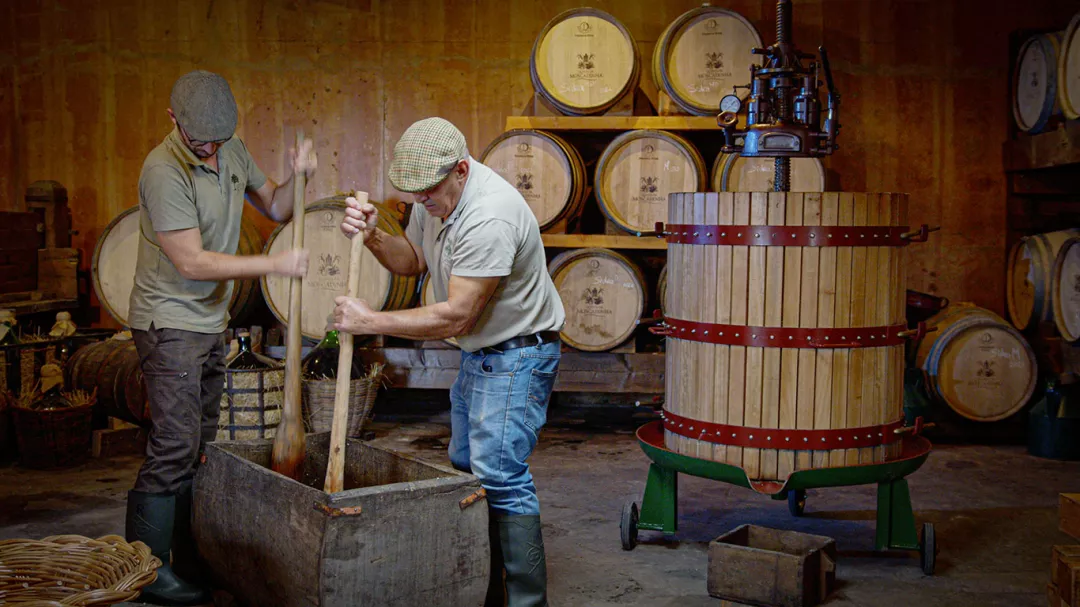General information
RDP Priority
- P2. Competitiveness
- P6. Social inclusion and local development
RDP Focus Area
- 2A: Farm’s performance, restructuring & modernisation
- 6B: Local development
RDP Measure
- M04: Investments in physical assets
- M19: LEADER/CLLD
Beneficiary type
- Small-Micro Enterprise
Summary
Getting in touch with nature and keeping alive the idea of 'country life' are concepts that have been lost by some and are indeed unknown to many. Quinta da Moscadinha harks back to the days when the Madeiran countryside was dotted with countless 'quintas', or rural properties, which are still fondly remembered today by the local population.
The quinta is set in beautiful natural surroundings and is home to traditional craftsmanship, promoting the art of wicker in its interior and exterior decoration. It also has an area reserved for raising animals.
Primarily, however, the property is home to a newly developed orchard and artisanal cider factory to boost a traditional activity that was once the lifeblood of this village, when family Sunday walks would always end in the village of Camacha, and everyone would enjoy the local cider.
This ambitious sidrotourism project also features the Adega do Pomar restaurant, with a menu of traditional Madeiran and Portuguese cuisine and a typical tavern recreating the Madeiran atmosphere of entertainment and conviviality, serving local drinks and snacks.
It is also an opportunity to pass on the history of cider and its production processes to visitors through guided tours, accompanied by tastings.
Results
Overnight hotel stays:
- 4 508 in 2022
- 5 345 in 2023
- 1 580 by April 2024
200 visits to the cider production site (individuals and groups, locals and tourists).
Cider production:
- 2022 – 2 000 litres
- 2023 – 9 000 litres
- 2024 – 30 000 litres (projection).
11 medals in two years.
80 tonnes of waste apples used.
20 abandoned orchards (3 000 trees) recovered.
2-3 new producers.
32 full-time jobs created (including for women and young people), one student internship.
Farmers now paid EUR 0.65/kg instead of EUR 0.15/kg.

Promoter
MLE - Madeira Leisure Entertainment, Lda. (Grupo MLE)
Funding
Total budget: 793 432 (EUR)
EAFRD: 334 417 (EUR)
National/Regional: 59 015 (EUR)
Private/Own funds: 400 000 (EUR)
Context

Márcio Nóbrega is a local entrepreneur who has already been heavily involved in several different projects on the Island of Madeira in areas such as catering, tourism and culture. All of them have been recognised publicly as adding value to this autonomous region.
His connection to the village of Camacha comes from his childhood. Like so many Madeirans around his age, weekend walks with his family usually included a stroll through this small village, which was a place where locals would gather.
The Quinta da Moscadinha project was originally seen solely as a business opportunity that would tap into the trend of rural tourism. While the main house was being restored, the work generated a connection with the local community and its history, tradition and, indeed, current challenges, most specifically, with the long-lost art of cider production.
Restoring such an important and ancient tradition soon became the focus of the project. In conjunction with local farmers and older landowners, the project started by recovering old and abandoned orchards, some of which had lain dormant for more than 50 years due to the migratory episodes that have affected the island. This has led to the regrowth of more than 3 000 trees.
The Quinta da Moscadinha hotel now aims to be a cider tourism focal point, nestling in beautiful countryside and featuring a typical Madeiran restaurant and cider cellar, designed to help locals and visitors learn more about Madeiran cider.
Objectives
The project hoped to tackle unemployment and the reliance on social benefits in this rural area by promoting the economic development of the village of Camacha. This has been driven by creating an aspect of rural tourism focused on cider, which will bring both visitors and locals alike to the village.
It also aimed to increase awareness around the value of the local variety of apple and its special features which make it ideal for the production of this unique cider, preserving its production method, and promoting local biodiversity and its integration into the Madeira Natural Park. At the same time, this would serve to encourage a new generation of apple growers while elevating cider producers and all of the small farmers in the village associated with its production, as the brand only uses apples from Camacha.
Activities

The Quinta da Moscadinha project began in 2019 with the acquisition of the property. By the following year, the remodelling and construction work on the main house had been successfully concluded, and the Quinta rural hotel was opened to the public. During this time, a portfolio of suppliers was drawn up with preference given to small, local companies to generate closer contacts and relationships. All Madeirans have a very special affection for the village of Camacha, and it was important for every stakeholder to have the same understanding and feeling for the project as those running it.
The Adega do Pomar restaurant opened in 2021. Again, it was crucial to choose a chef and head waiters with the same passion and will to revive this village and this tradition. The main purpose behind the restaurant was to devise a menu that reflected the local identity as a people.
The cider-production and tourism project was also launched in parallel. Initially, the Camacha apple producers did not appreciate an ‘outsider’ from Funchal coming to their village with ambitious ideas, and a number of them were unwilling to sell their apples to Márcio. He took the time to visit them all and explain the project, showing how it would lead to a renaissance of Camacha and its ancient traditions and – more importantly – provide them with supplemental income and a way of maximising their production, as opposed to having apples rotting or falling from the trees and being ignored out of a lack of demand.
Many producers began to call him back and ask him to visit their orchards, seeking advice on how to nurture the trees and produce even better apples. Due to the cider cellar's limited capacity at that time, more apples were offered to Márcio than could be used. However, farmers are now waiting for the coming summers with supply agreements in place.
The cider cellar was completed in 2022, and production began using new equipment, such as an apple press, apple mill, treadmill and vats with cold braces, which were purchased with the help of subsidies, including from the European Agricultural Fund for Rural Development, without which it would not have been possible to achieve a suitable level of production. More land was acquired in 2023 to enlarge the cider cellar and production and again in 2024 to enlarge the cider tourism area.
Main results
The hotel generated 4 508 overnight stays in 2022, 5 345 in 2023 and 1 580 by April 2024. There have been around 200 visits to the cider production site, with a mix of individuals and groups, from the local community and tourists.
In 2022, 2 000 litres of cider were produced. This was vastly increased to 9 000 litres in 2023, and now the company projects 30 000 litres of production in 2024. The cider has already won 11 medals in the past two years.
Since the project started, the company has already used around 80 tonnes of apples that would otherwise have gone to waste. More significantly, they have made a real contribution to environmental protection: 20 abandoned orchards (totalling around 3 000 trees) have been recovered, with 2-3 people who have become producers. Overall, the project has been able to create 32 full-time jobs, many of them for women and young people, as well as an internship for a tourism degree student at the ISAL higher institute for administration and languages. It has also promoted several cider workshops and events for locals, regional authorities and tourists.
Various other stakeholders have been brought on board, including local apple farmers and other small producers, local wicker craftspeople, regional tourism, energy and animal health boards, and Santander Bank. The farmers are now also being paid EUR 0.65 per kilogramme for their apples – an increase from the original rate of EUR 0.15, recognising the upgrade in quality.
Key lessons
The project has brought Madeiran families back to Camacha, restored a five-century-old tradition of cider production and taken it to new heights. Furthermore, it is providing locals not only with a place to work close to home, but also fostering a sense of identity in the community, making it more united and active, and thus more attractive.
The initial lack of good-quality apples due to abandoned and untreated orchards has been turned around by working side-by-side with local producers. The resulting increase in production means that only apples from Camacha now have to be used.
Márcio Nóbrega

